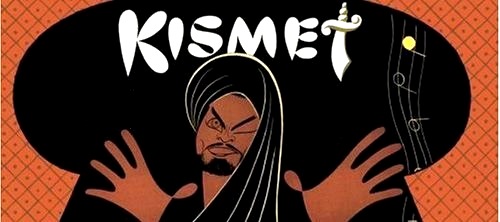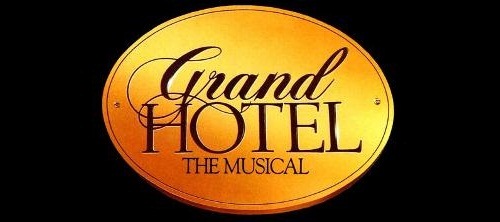Pas de biographie disponible.
Compositeur Musique additionelle Librettiste Parolier Metteur en scène Chorégraphe Producteur création Producteur version

Musical
Musique: George Forrest • Robert Wright • Paroles: George Forrest • Robert Wright • Livret: Charles Lederer • Luther Davis • Production originale: 6 versions mentionnées
Dispo: Résumé Synopsis Génèse Isnpiration Liste chansons
Avec trois Tony Awards (dont celui de la meilleure comédie musicale), une version télévisée et un film à succès de la MGM, Kismet est l'une des comédies musicales les plus renommées à avoir honoré la Great White Way. Kismet a fait ses preuves auprès du public à maintes reprises, grâce à son cadre exotique, ses personnages attachants et son sens de l'humour ironique... sans oublier une partition luxuriante adaptée des mélodies envoûtantes d'Alexandre Borodine.
Genèse: Source Le musical a été commandé par Edwin Lester, fondateur et directeur du Civic Light Opera de Los Angeles, qui a conçu un musical basée sur la pièce Kismet d’Edward Knoblock de 1911. Lester avait déjà produit Song of Norway, avec la même équipe, adaptant les mélodies d’Edvard Grieg. Pour Kismet, les auteurs se sont emparés des mélodies d’Alexandre Borodine, qui avaient une juste saveur exotique et des mélodies luxuriantes. Création aux États-Unis (Los Angeles, San Francisco , Broadway) (1953) Kismet a été créé à Los Angeles, puis s’installe à San Francisco à l’été et à l’automne 1953. Un changement important a eu lieu pendant les previews transformant le caractère de Hajj d’un simple mendiant à un mendiant-poète. Charles Lederer devint producteur et librettiste. La production déménage alors à Broadway le 3 décembre 1953, jouant au Ziegfeld Theatre. La mise en scène est d'Albert Marre, avec une chorégraphie de Jack Cole et de somptueux décors et costumes de Lemuel Ayers. La distribution originale a mis en vedette Alfred Drake dans le rôle du poète Hajj, Doretta Morrow comme sa fille Marsinah, Richard Kiley comme le jeune calife de Bagdad, Henry Calvin comme le Wazir, et Joan Diener comme Lalume, la femme vampy du Wazir. Bill Johnson plus tard a repris le rôle de Hajj, et Elaine Malbin le rôle de Marsinah. Manque de bol, le spectacle a ouvert à Broadway en pleine grève de la presse. Comme les critiques des journaux n’étaient pas disponibles, les producteurs ont utilisé la publicité télévisée pour promouvoir le spectacle. Le musical a trouvé son public et a connu un vrai succès durant 583 représentations, remportant le Tony Award for Best Musical. Paradoxalement, la grève a peut-être finalement contribué à la popularité du spectacle, puisque les critiques, arrivant quelques semaines après l’ouverture, n’ont pas toutes été favorables. Un critique, pointant sur le nom du compositeur Borodine, a dénigré la partition comme «a lot of borrowed din». Walter Kerr a écrit que : «It's the sort of show that would sell its soul for a joke, and the jokes should be better at the price.» William Hawkins, cependant, a écrit qu’il était «noisy, spectacular, and vigorous. ... It is melodic and gay.» Création à Londres (1955) Kismet connut encore un plus gros succès dans le West End de Londres, avec 648 représentations au Stoll Theatre à partir d’avril 1955. La production londonienne a ouvert avec les trois vedettes de la distribution de Broadway, Drake, Morrow et Diener. Ils ont ensuite été remplacés par Tudor Evans, Elizabeth Larner et Sheila Bradley, respectivement. Revivals Le musical est repris au New York State Theatre du Lincoln Center, à partir du 22 juin 1965, pour 39 représentations avec Drake, Lee Venora, Anne Jeffreys et Henry Calvin. Abandonnant le contexte oriental luxuriant de l’original, un revival rebaptisé Tombouctou! a ouvert au Mark Hellinger Theatre le 1er mars 1978 et a tenu l'affiche pour 243 représentations. Cette version, avec un nouveau livret de Luther Davis, déplace l’histoire en Afrique, avec des décors minimalistes. L’accent de l’intrigue a été déplacé, avec Eartha Kitt dans le rôle de Lalume. Le New York City Opera présente le musical en octobre 1985, avec George Hearn (Hajj) et Maryanne Telese (Marsinah) sous la direction de Frank Corsaro. Un enregistrement en studio du musical a été réalisé en 1991 avec Samuel Ramey, Ruth Ann Swenson, Jerry Hadley, Dom DeLuise, Mandy Patinkin et Julia Migenes. Le New York City Center Encores! a présenté une version semi-concert en février 2006, mettant en vedette Brian Stokes Mitchell et Marin Mazzie. Le musical a été repris en 2007 par l’English National Opera au London Coliseum et a mis en vedette le vétéran du West End Michael Ball et Alfie Boe. Adaptations au cinéma et à la télévision Le musical a été transformé en film Cinemascope en 1955 par la MGM, réalisé par Vincente Minnelli et mettant en vedette Howard Keel dans le rôle de Hajj, Ann Blyth dans celui de Marsinah, Dolores Gray dans celui de Lalume et Vic Damone dans celui du calife. Le quatuor This is My Beloved a été remplacé par un trio, parce que Sebastian Cabot, qui jouait le Wazir, ne pouvait pas chanter. Une version pour la télévision, filmé à l'Armstrong Theater a été diffusée en 1967 avec Barbara Eden comme Lalume, José Ferrer comme Hajj, Anna Maria Alberghetti comme Marsinah et George Chakiris comme le calife. Le script a été adapté pour une diffusion de 90 minutes, mais il a coupé peu de numéros musicaux malgré le temps d’exécution plus court.
Résumé: Avec une extrême intelligence et une bonne dose de chance, le pauvre poète de rue, Hajj, quitte les rues de Bagdad pour être couronné Emir par le Wazir de Bagdad. Pendant ce temps, le Wazir essaie désespérément de trouver une princesse étrangère riche pour que le Calife se marie. Ce plan tombe à pic lorsque le Calife tombe amoureux de la belle fille de Hajj, Marsinah, à l’insu de Hajj. Ainsi, Hajj aide le Wazir mais risque de perdre son gendre. Après une série d’aventures, le calife et Marsinah sont en mesure de poursuivre leur histoire d’amour tandis que Hajj est récompensé par gagner l’affection de la veuve sexy du Wazir, Lalume.
Création: 3/12/1953 - Ziegfield Theatre (Broadway) - représ.

Musical
Musique: George Forrest • Maury Yeston • Robert Wright • Paroles: George Forrest • Maury Yeston • Robert Wright • Livret: Luther Davis • Production originale: 6 versions mentionnées
Dispo: Synopsis Génèse Liste chansons
Genèse: While it's true that most musicals take a long time to get to Broadway, GRAND HOTEL's journey was particularly long--almost 30 years! Menschen im Hotel marked the beginning of the career of popular Austrian novelist Vicki Baum in 1929. She dramatized the novel for the Berlin stage later in the same year. The play became a hit, and its English-language adaptation enjoyed success in New York in the early 1930s and was made in to the blockbuster 1932 Academy Award-winning film, Grand Hotel, starring John Barrymore, Greta Garbo and Joan Crawford. At the Grand Davis, Wright, and Forrest first adapted Baum's story in 1958 under the title At the Grand, changing the setting from 1928 Berlin to contemporary Rome and transforming the ballerina into an opera singer closely resembling Maria Callas to accommodate Joan Diener, who was scheduled to star under the direction of her husband Albert Marre. All of them had collaborated on the earlier musical Kismet and anticipated another success, but Davis' book strayed too far from the story familiar to fans of the film. When Paul Muni agreed to portray Kringelein, the role was changed and expanded, with the character becoming a lowly hotel employee whose stay in a hotel suite is kept secret from the management. Flaemmchen became a dancing soubrette, Preysing and his dramatic story line were eliminated completely, and two deported American gangsters were added for comic relief. At the Grand opened to mixed reviews and good business in Los Angeles and San Francisco, but when an unhappy Muni refused to extend his preliminary contract and left the production, producer Edwin Lester decided to cancel the Broadway opening scheduled for September 25, 1958, and everyone moved on to other projects. Grand Hotel Three decades later, Davis, Wright, and Forrest decided to dust off their original material and give the show another try. This time it was placed in the hands of director/choreographer Tommy Tune, who envisioned it as a two-hour, non-stop production comprising dialogue scenes, musical numbers, and dance routines overlapping and at times competing with each other, thereby capturing the mood of a bustling hotel where something is happening at all times. Seven songs from At the Grand were incorporated into what was now called Grand Hotel, although two were dropped during the Boston tryout. The creative team proved to be too attached to the original material and resisted every change that Tune proposed. "Bluntly stated, the show didn’t work. With the exception of the choreography and the physical trappings, the show was deadly," Tune recalled in his memoir Footnotes. Frustrated, he finally fired Wright and Forrest and brought in Maury Yeston in 1989, with whom he had worked in Nine, to compose six new songs and revise others (including rewriting over half the lyrics in the show). He also hired Peter Stone to doctor Davis' book, although Stone refused official credit for his work. Tune later commented, "I hate it when it gets ugly on a show. It always does though, and you've gotta be hearty to survive. If it's not the writers, then it's the producers or the cast. There is always turmoil, but if you're lucky some good can come of it all. I have always tried to be kind to everyone, but please don’t mistake my kindness for weakness." Broadway and subsequent productions After thirty-one previews, Grand Hotel opened on November 12, 1989 at the Martin Beck Theatre, and later transferred to the George Gershwin to complete its total run of 1,017 performances. The show is played without an intermission. The original cast included Liliane Montevecchi as Elizaveta Grushinskaya, Michael Jeter as Otto Kringelein (garnering much praise and several awards), David Carroll as the Baron, Timothy Jerome as Preysing, John Wylie as Otternschlag, Bob Stillman as Erik, and Jane Krakowski as Flaemmchen. Replacements later in the run included Cyd Charisse (in her Broadway debut at age 70) and Zina Bethune as Elizaveta, Austin Pendleton and Chip Zien as Otto, and John Schneider, Rex Smith, and Brent Barrett as the Baron. The production captured 12 Tony nominations, winning five awards, including best direction and choreography for Tommy Tune. The release of the much in-demand original cast recording was delayed nearly two years due to legal disputes with Wright and Forrest. By the time the situation was resolved, Carroll was seriously ill with AIDS, and died from a pulmonary embolism while in the bathroom of the recording studio early in the session. Brent Barrett, who had appeared as the Baron both on Broadway and in the national tour, sang the role for the cast album released by RCA Victor. As an homage to Carroll the cast album features a bonus track of his performance during a 1991 cabaret fundraiser for Equity Fights AIDS, singing the Baron's major song, "Love Can't Happen". The first West End production opened on July 6, 1992 at the Dominion Theatre, where it ran for slightly less than four months. In 2004, Mary Elizabeth Mastrantonio starred as Elizaveta in a small-scale production directed by Michael Grandage at the Donmar Warehouse.
Résumé:
Création: 12/11/1989 - Al Hirschfeld Theatre (Broadway) - représ.

.png)
.png)




